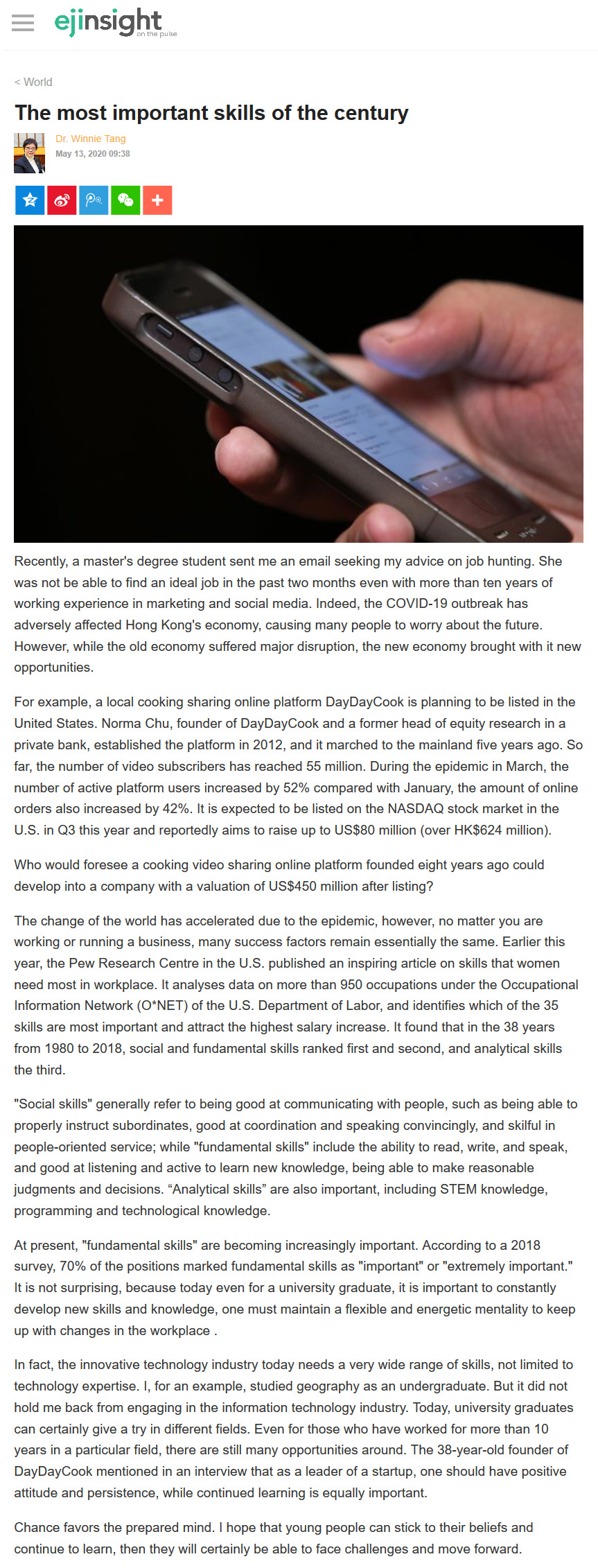網上版請按此

The most important skills of the century
Recently, a master's degree student sent me an email seeking my advice on job hunting. She was not be able to find an ideal job in the past two months even with more than ten years of working experience in marketing and social media. Indeed, the COVID-19 outbreak has adversely affected Hong Kong's economy, causing many people to worry about the future. However, while the old economy suffered major disruption, the new economy brought with it new opportunities.
For example, a local cooking sharing online platform DayDayCook is planning to be listed in the United States. Norma Chu, founder of DayDayCook and a former head of equity research in a private bank, established the platform in 2012, and it marched to the mainland five years ago. So far, the number of video subscribers has reached 55 million. During the epidemic in March, the number of active platform users increased by 52% compared with January, the amount of online orders also increased by 42%. It is expected to be listed on the NASDAQ stock market in the U.S. in Q3 this year and reportedly aims to raise up to US$80 million (over HK$624 million).
Who would foresee a cooking video sharing online platform founded eight years ago could develop into a company with a valuation of US$450 million after listing?
The change of the world has accelerated due to the epidemic, however, no matter you are working or running a business, many success factors remain essentially the same. Earlier this year, the Pew Research Centre in the U.S. published an inspiring article on skills that women need most in workplace. It analyses data on more than 950 occupations under the Occupational Information Network (O*NET) of the U.S. Department of Labor, and identifies which of the 35 skills are most important and attract the highest salary increase. It found that in the 38 years from 1980 to 2018, social and fundamental skills ranked first and second, and analytical skills the third.
"Social skills" generally refer to being good at communicating with people, such as being able to properly instruct subordinates, good at coordination and speaking convincingly, and skilful in people-oriented service; while "fundamental skills" include the ability to read, write, and speak, and good at listening and active to learn new knowledge, being able to make reasonable judgments and decisions. “Analytical skills” are also important, including STEM knowledge, programming and technological knowledge.
At present, "fundamental skills" are becoming increasingly important. According to a 2018 survey, 70% of the positions marked fundamental skills as "important" or "extremely important." It is not surprising, because today even for a university graduate, it is important to constantly develop new skills and knowledge, one must maintain a flexible and energetic mentality to keep up with changes in the workplace .
In fact, the innovative technology industry today needs a very wide range of skills, not limited to technology expertise. I, for an example, studied geography as an undergraduate. But it did not hold me back from engaging in the information technology industry. Today, university graduates can certainly give a try in different fields. Even for those who have worked for more than 10 years in a particular field, there are still many opportunities around. The 38-year-old founder of DayDayCook mentioned in an interview that as a leader of a startup, one should have positive attitude and persistence, while continued learning is equally important.
Chance favors the prepared mind. I hope that young people can stick to their beliefs and continue to learn, then they will certainly be able to face challenges and move forward.
Dr. Winnie Tang
Adjunct Professor, Department of Computer Science, Faculty of Engineering and Faculty of Architecture, The University of Hong Kong